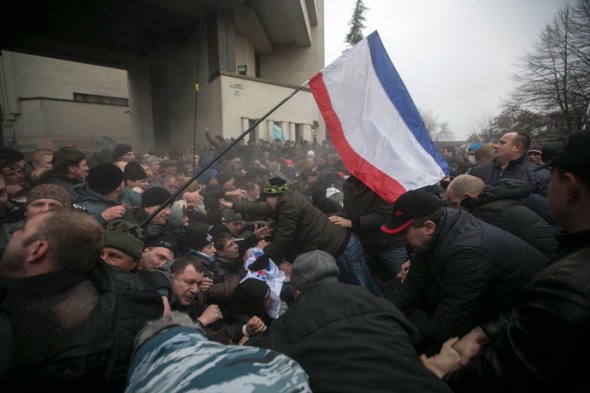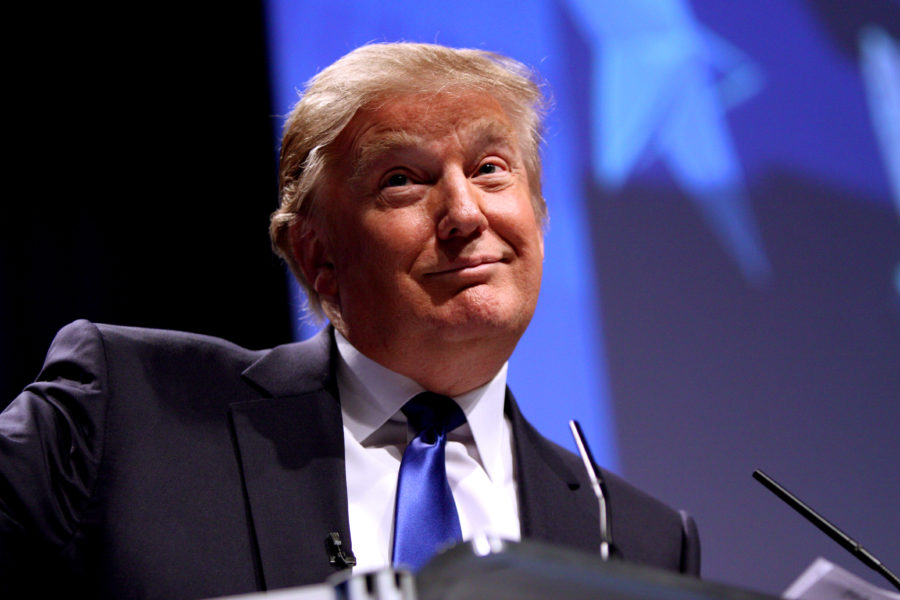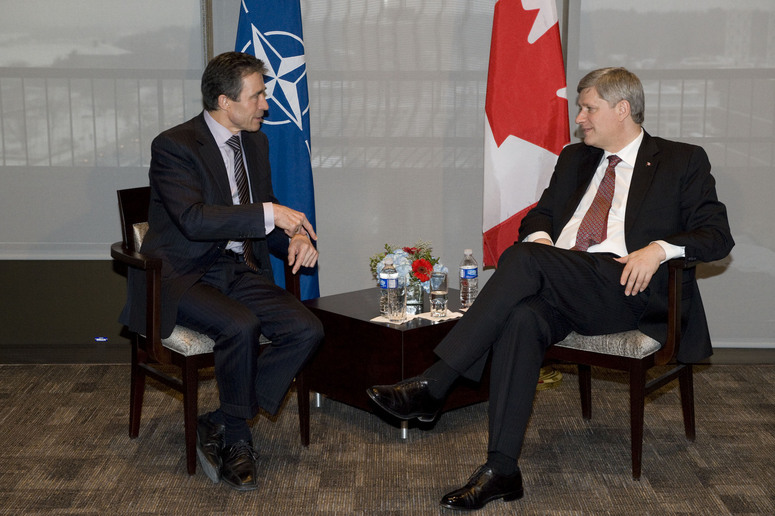Russian President Vladimir Putin has justified moving the Russian military into Crimea based on “the unrelenting threat of violence from ultra-nationalist forces that endangered the life and legal interests of Russian citizens,” according to Russian officials. “The measures taken by Russia [sending military forces into Crimea] are fully adequate with regard to the current extraordinary situation.” Russian parliament approved Putin’s use of military force throughout the entire country of Ukraine which is concerning, but so far Russia has only moved to secure Crimea, which it has done bloodlessly, in large part due to popular support for Russia within Crimea. In fact, Ukraine’s naval commander Denis Berezovsky has been charged with treason for choosing not to provide resistance against the Russian Navy over the weekend. Once again, this case of mutiny demonstrates the questionable democratic credentials of the new Ukrainian government which lacks support even from elites within its own military.
 Russia has entered Crimea, to both protect Russian people and to secure its access to the port of Sevastopol. Both are key Russian interests. While this violates the principle of territorial sovereignty, there is a strong moral argument as well as a political argument to be made that releasing Crimea from Ukraine is the only available solution to the current conflict. Firstly, Crimea was Russian territory from 1783-1954 before which it was part of the Ottoman Empire. Nikita Khrushchev gave Crimea to Ukraine without any consideration of the possibility that the Soviet Union would one day cease to exist, which is what happened in 1991 when Ukraine left the Union with Crimea. Agreements with successive Ukrainian governments to give Russia access to this port have prevented territorial conflict in the past. Russia has a lease on the port which extends until 2042. But the current Ukrainian government is opposed to Russian influence which may threaten Russia’s access to the Black Sea port in the future when the lease expires. But Russia could conceivably build another Black Sea port in or near Sochi. The real issue for Russia is stability on its borders and the safety of Russians in Crimea and Ukraine generally. The moral argument is that leaving a Russian population vulnerable to attacks by Western radicals will inflame an already chaotic situation and will not solve the current state of polarization that exists in Ukraine. The ceding of Crimea to Russia would give Ukraine a clear pro-western majority and give Russia a small victory, permanent access to the Sevastopol Port and most importantly, security for Crimea’s Russian majority.
Russia has entered Crimea, to both protect Russian people and to secure its access to the port of Sevastopol. Both are key Russian interests. While this violates the principle of territorial sovereignty, there is a strong moral argument as well as a political argument to be made that releasing Crimea from Ukraine is the only available solution to the current conflict. Firstly, Crimea was Russian territory from 1783-1954 before which it was part of the Ottoman Empire. Nikita Khrushchev gave Crimea to Ukraine without any consideration of the possibility that the Soviet Union would one day cease to exist, which is what happened in 1991 when Ukraine left the Union with Crimea. Agreements with successive Ukrainian governments to give Russia access to this port have prevented territorial conflict in the past. Russia has a lease on the port which extends until 2042. But the current Ukrainian government is opposed to Russian influence which may threaten Russia’s access to the Black Sea port in the future when the lease expires. But Russia could conceivably build another Black Sea port in or near Sochi. The real issue for Russia is stability on its borders and the safety of Russians in Crimea and Ukraine generally. The moral argument is that leaving a Russian population vulnerable to attacks by Western radicals will inflame an already chaotic situation and will not solve the current state of polarization that exists in Ukraine. The ceding of Crimea to Russia would give Ukraine a clear pro-western majority and give Russia a small victory, permanent access to the Sevastopol Port and most importantly, security for Crimea’s Russian majority.
There are concerns that the ceding of Crimea would not be the end of the conflict, but would instead result in the balkanization of Ukraine. Odessa has a majority Russian speaking population which voted for Yanukovych’s Party of the Regions in the last election and Russia could potentially use the argument of protecting Russian speakers from right wing extremists to send its army into Odessa as well. Putin has already received permission from Russia’s parliament to send troops into the entirety of Ukraine. But the argument here would be weaker. Odessa’s Russian-speakers are not as ethnically Russian, and, while Odessa has historically been part of the Russian Empire, it has been part of Ukraine for much longer and even geographically looks like it belongs to Ukraine more so than Crimea.
The stakes involved in the separation of both Odessa and Crimea from Ukraine are much higher than Crimea alone. Ukraine imports 65% of its natural gas from Russia which gives Russia substantial control over Ukraine’s internal affairs. Ukraine can import crude oil and gasoline from Sevastopol and Odessa which are the two major ports in Ukraine. It has not been economically or technically possible to import natural gas from the Black Sea in the past, but in order to break Russia’s grip over Ukraine, the possibility is now being explored. There are serious discussions about building a liquefied natural gas receiving terminal in Odessa which would be operational by 2018. The energy supply diversification this terminal would provide could substantially decrease Ukrainian reliance on Russia. But if Russia takes Odessa in addition to Crimea, then Ukraine would be unable to diversify its natural gas imports.
If NATO has thought about drawing a red line in the sand, it should be Odessa, not Crimea. Without Crimea, Ukraine could achieve a stable pro-Western majority capable of energy independence. Without Odessa, Ukraine would be subject to continued Russian domination. But holding onto Crimea will only serve to maintain the current political crisis. Therefore the international community should accept the outcome of Crimea’s national referendum set to be held on March 30 asking whether Crimea should be part of Ukraine or independent.




